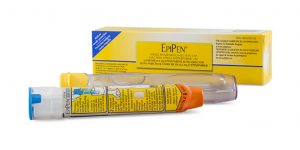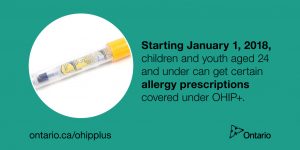Check out our year in review with our advocacy initiatives, it’s been a busy 2018 making big changes on your behalf! Plus, have your say – learn about the upcoming OHIP+ changes in Ontario and let the government know how these changes impact you, and if you’re a post-secondary student, be sure to participate in an important research study!
Plus, learn about the latest in food allergy research: Learn how Canadian emergency departments treat anaphylaxis when the cause is unknown, get updated on the Viaskin Peanut Patch, find out about Aimmune’s OIT egg trials, and learn if the diet in pregnancy impacts the baby’s risk of developing food allergy.
Check out this month’s mythbuster: Are hives or other skin symptoms always present with a severe allergic reaction?
Advocacy in action: 2018 year in review
2018 was a busy year for our advocacy efforts on your behalf. We’ve highlighted a few of our accomplishments for you to check out below:
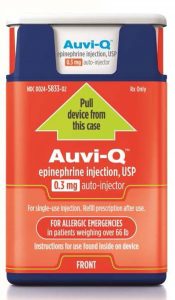 Helped to secure a second supplier of epinephrine auto-injectors during a crucial shortage period.
Helped to secure a second supplier of epinephrine auto-injectors during a crucial shortage period.
In 2018, there was ongoing uncertainty around EpiPen® supply. At different times, you may not have been able to secure a device, or get your full prescription filled. It is unacceptable to not have access to life-saving medication.
Our advocacy on your behalf helped to secure alternate temporary supply of epinephrine auto-injectors to ensure you and every Canadian with severe allergies could access epinephrine.
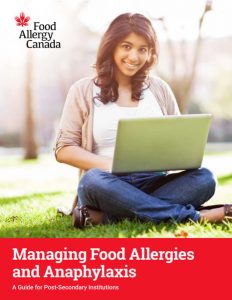 Launched our post-secondary initiative to support over 150,000 youth who are at the highest risk of having a severe allergic reaction.
Launched our post-secondary initiative to support over 150,000 youth who are at the highest risk of having a severe allergic reaction.
Given that so many post-secondary students have food allergies, ensuring colleges and universities are allergy-aware is essential. This guide is focused on educating institutions on the management of food allergies and understanding how to best support affected students while encouraging good self-management habits. Over 55% of campuses have downloaded the guide so far, with almost 1,000,000 students collectively attending those campuses.
Continued our ongoing foodservice advocacy with government and industry.
 Assembled a multi-stakeholder team with leaders in the foodservice industry, food allergy research, and others to work on developing guidelines that help restaurants to be more allergy aware and better understand what is needed to accommodate the needs of Canadians with food allergies.
Assembled a multi-stakeholder team with leaders in the foodservice industry, food allergy research, and others to work on developing guidelines that help restaurants to be more allergy aware and better understand what is needed to accommodate the needs of Canadians with food allergies.- We were successful in our advocacy with the Ontario Ministry of Health and Long-Term Care to include more robust food allergy education for foodservice as a part of their food safety training requirements.
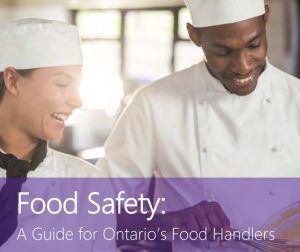 This resulted in a more detailed section on food allergy management in their updated food handlers guide (pages 16-22). This guide provides knowledge of safe food handling practices for restaurants and foodservice staff, including a section on food allergens. The updated guide is a positive step forward in our push for consistent guidelines across the industry, so you can make informed choices when eating out.
This resulted in a more detailed section on food allergy management in their updated food handlers guide (pages 16-22). This guide provides knowledge of safe food handling practices for restaurants and foodservice staff, including a section on food allergens. The updated guide is a positive step forward in our push for consistent guidelines across the industry, so you can make informed choices when eating out.
Allergen labelling advocacy in Canada and around the world
- Precautionary labelling:
 Currently, there are no consistent or standard methodologies for using precautionary allergen labelling globally (e.g. may contain statements), which poses safety concerns for individuals with food allergies.
Currently, there are no consistent or standard methodologies for using precautionary allergen labelling globally (e.g. may contain statements), which poses safety concerns for individuals with food allergies.
Last year, we led an initiative with 21 other patient organizations from around the world and submitted a letter to the Codex Alimentarius Commission (Codex) urging them to address this issue using a scientific risk-based approach. If adopted, this will allow consumers to make safer, more informed food choices and provide food manufacturers with greater clarity when making allergen labelling decisions.
Codex develops internationally recognized standards, codes of practice, guidelines, and other recommendations relating to foods, food production, and food safety.  Self-care product labelling in Canada:
Self-care product labelling in Canada:
Late last year, we re-iterated to Health Canada our recommendations for improved allergen labelling and the need to have ingredient information that allows for informed decision-making when purchasing self-care products.
These recommendations will be put forward by Health Canada as they move to finalize the updated regulations in early 2019.- Allergen labelling on beer:
 Continued our advocacy by participating in consultations with the Canadian Food Inspection Agency (CFIA) to push for clear allergen labelling on standardized beer. We will keep you informed of the results of this consultation.
Continued our advocacy by participating in consultations with the Canadian Food Inspection Agency (CFIA) to push for clear allergen labelling on standardized beer. We will keep you informed of the results of this consultation.
We are your voice
-
Called on Air Canada to not remove passengers with food allergies and to clarify its allergen policies to ensure no passenger is denied service due to their medical condition.
-
Spoke to WestJet to understand their allergy policy changes and urged them to clarify their communications and impact to passengers around those changes. As a result, they did update their communications and provided greater clarity.
-
Called out Sony Pictures Entertainment about the negative portrayal of food allergy in the Peter Rabbit movie.
This year, we will continue to advocate strongly on your behalf, helping to ensure you and all Canadians with food allergies can live more confidently.
Advocacy: OHIP+ changes – let the Ontario government know how these changes impact you
The Ontario government recently announced its changes to the OHIP+ Youth Pharmacare Program. The current program provides anyone age 24 years or younger with access to 4,400 drug products listed on the Ontario Drug Benefit Plan, for free, including epinephrine auto-injectors. Please see below for a quick update on what’s changing.
What’s staying the same
OHIP+ benefits will continue for children and youth who are 24 years old or younger with no existing prescription drug benefits covered by private plans.
What’s changing
As of March 2019, OHIP+ coverage will not extend to children and youth who have private insurance coverage. Prescriptions for this group will be billed to their insurance providers. Individuals or families who have significant out-of-pocket costs, despite having private insurance coverage, could apply for additional financial support through the Trillium Drug Program as was done prior to the implementation of OHIP+.
Have your say
The Ontario government is currently conducting a public consultation on these changes. We are preparing a submission on behalf of our community to seek greater clarification on the ramifications of these changes on Canadians with food allergy and their ability to access affordable medication, specifically epinephrine auto-injectors.
Have your say and let the Ontario government know how these changes will impact you. Click here to learn more and provide your input. The consultation is open until January 31st, 2019.
Research: University students – Participate in a new study
 If you are a university student with food allergies attending McGill University, McMaster University, Queen’s University or the University of British Columbia, you are invited to participate in a research study looking at the experiences of university students with food allergies.
If you are a university student with food allergies attending McGill University, McMaster University, Queen’s University or the University of British Columbia, you are invited to participate in a research study looking at the experiences of university students with food allergies.
How to participate
Please complete a short, online survey. It should take up to 10 minutes to complete.
- Survey link: www.surveymonkey.com/r/foodallergystudentsurvey
- The survey is closes on February 28, 2019
Survey details
Survey findings will help researchers, and patient organizations like ours, better understand how students with food allergies are supported on campuses. All data collected will remain anonymous.
If you have any general questions about the study, please contact Ernie Avilla, Research Coordinator, McMaster University, Canada at avillae@mcmaster.ca or call 289-921-8716.
Share, share, and share! Please spread the word and share with students with food allergies attending these institutions.
Research: Study found inconsistent treatment for anaphylaxis when the cause is unknown
A Canadian study led by AllerGen investigators was recently published in The Journal of Allergy and Clinical Immunology: In Practice. The study reviewed nearly 4,000 cases of anaphylaxis reported by Canadian emergency departments from 2011 to 2018.

Dr. Ben-Shoshan
“In our study, the cause of 7.5 percent of the anaphylaxis cases was unknown. We found that the treatment and follow up of anaphylaxis due to an unknown trigger (AUT) were sub-optimal and inconsistent both inside and outside of the hospital,” says lead researcher Dr. Moshe Ben-Shoshan, a pediatric allergist and immunologist at the Research Institute of the McGill University Health Centre, and the Montreal Children’s Hospital. He is also on Food Allergy Canada’s healthcare advisory board.
 Among the study’s other findings:
Among the study’s other findings:
- Nearly one-fifth of patients with AUT were not prescribed an epinephrine autoinjector;
- Adults were less likely to receive an epinephrine autoinjector prescription than children;
- Only 56 percent of patients with AUT (mostly children) were referred to an allergist;
- Of the patients assessed by an allergist, a trigger for their reaction was identified in 38 percent of cases.
“The underuse of epinephrine and the low rates of referral to an allergist, mainly in adults with AUT, highlight the need for clear guidelines and educational programs for diagnosis and management,” says study first-author Michelle Le, a medical student at McGill University and an AllerGen trainee.
“The important takeaway from this study is that there are significant discrepancies in treatment and follow up of patients with AUT that must be addressed in order to ensure prompt and appropriate management of anaphylaxis.”
AllerGen NCE Inc., the Allergy, Genes and Environment Network (est. 2004), is a national research network dedicated to improving the quality of life of people with allergic and related immune diseases.
Read AllerGen’s full press release.
Research: DBV Technologies Shares Update on Viaskin Peanut Patch

Example of Viaskin patch. Source: DBV Technologies
DBV Technologies announced last month that they have withdrawn their Biologics License Application (BLA) for Viaskin Peanut for the treatment of peanut allergy in children four to 11 years of age, after discussions with the U.S. Food and Drug Administration (FDA).
“Although the agency did not reference any medical or clinical questions with the submission of Viaskin Peanut, the FDA did communicate that the level of detail with regards to data on manufacturing and quality controls was insufficient in the BLA,” said Daniel Tassé, Chief Executive Officer of DBV Technologies. “We remain confident in the clinical profile of Viaskin Peanut and its potential to offer treatment to peanut-allergic children. Our plan is to address these concerns as quickly as possible and to work closely with the FDA to provide an updated and complete file.”
According to DBV, all ongoing clinical trials with Viaskin Peanut will continue as planned.
Research: Aimmune begins Phase 2 oral immunotherapy study in egg allergic patients
 Aimmune Therapeutics, Inc., the biopharmaceutical company known for developing treatments such as AR101, an investigational oral immunotherapy (OIT) for the treatment of peanut allergy, announced they will be developing a new drug application for AR201 for the treatment of egg allergy.
Aimmune Therapeutics, Inc., the biopharmaceutical company known for developing treatments such as AR101, an investigational oral immunotherapy (OIT) for the treatment of peanut allergy, announced they will be developing a new drug application for AR201 for the treatment of egg allergy.
Academic studies of the oral immunotherapy approach for egg allergy treatment have shown efficacy, and Aimmune’s AR201 program will study this more broadly, with a biologic drug product, in order to enable widespread availability of a potential treatment.
Phase 2 clinical trials for AR201 are planned for 2019.
Research: U.S. study found diet during pregnancy did not impact the baby’s risk of having food allergy
 As a first step toward understanding how diet during pregnancy impacts allergies in offspring, a research team led by Karen Robbins, M.D., an allergist at Children’s National Health System, pored through a longitudinal study conducted by the Food and Drug Administration (FDA) and the Centers for Disease Control and Prevention.
As a first step toward understanding how diet during pregnancy impacts allergies in offspring, a research team led by Karen Robbins, M.D., an allergist at Children’s National Health System, pored through a longitudinal study conducted by the Food and Drug Administration (FDA) and the Centers for Disease Control and Prevention.
The study tracked 2,000 pregnant women from the third trimester of pregnancy and their infants through the first year of life. A small percentage of women said they consumed fewer allergens during pregnancy to stave off food allergies in their newborns.
Despite the diet changes, infants born to these expectant mothers were twice as likely to experience problems with food at age 4 months—though not at age 9 months or 12 months. And these infants were no more likely to be diagnosed with a food allergy.
Read the full article. Please note, this article does not constitute medical advice. Please talk to your doctor about any concerns or questions you may have regarding your own health.
Mythbuster: Are hives or other skin symptoms always present with a severe allergic reaction?

FACT: Some anaphylactic reactions occur without any skin symptoms.
Learn how to recognize the signs and symptoms of an allergic reaction so that you can give life-saving treatment early. Most allergic reactions happen within minutes to a few hours after contact with an allergen. Symptoms and severity of a reaction can differ each time. Keep in mind that an allergic reaction can start with mild symptoms that can get worse quickly.
Bottom line: An allergic reaction can occur without skin symptoms (e.g. hives or swelling) and not every reaction will always look the same, a person can have different symptoms each time.
Bonus: Watch this two-minute video to learn more about the signs and symptoms of anaphylaxis.
Help us educate your communities and share this Mythbuster with them! Stay tuned for more Mythbusters to come.
Check out our blog for other myths about:
- Someone who has been treated with an epinephrine auto-injector doesn’t necessarily need to go to the hospital
- Some allergies are more “severe” than others
- Eating a little allergen will increase tolerance and cure allergy
- Age requirement for allergy testing
- Cooking at high temperatures kills allergen proteins
- “May contain” allergen labelling is mandatory
- Results of skin prick tests indicate severity of allergy
- Pesticides and other chemicals can trigger allergies
- Epinephrine auto-injectors cure food allergy
- Which allergens cause life-threatening reactions
- Using Benadryl
- Food allergy “cures”
- Celiac disease is the same as a wheat allergy

